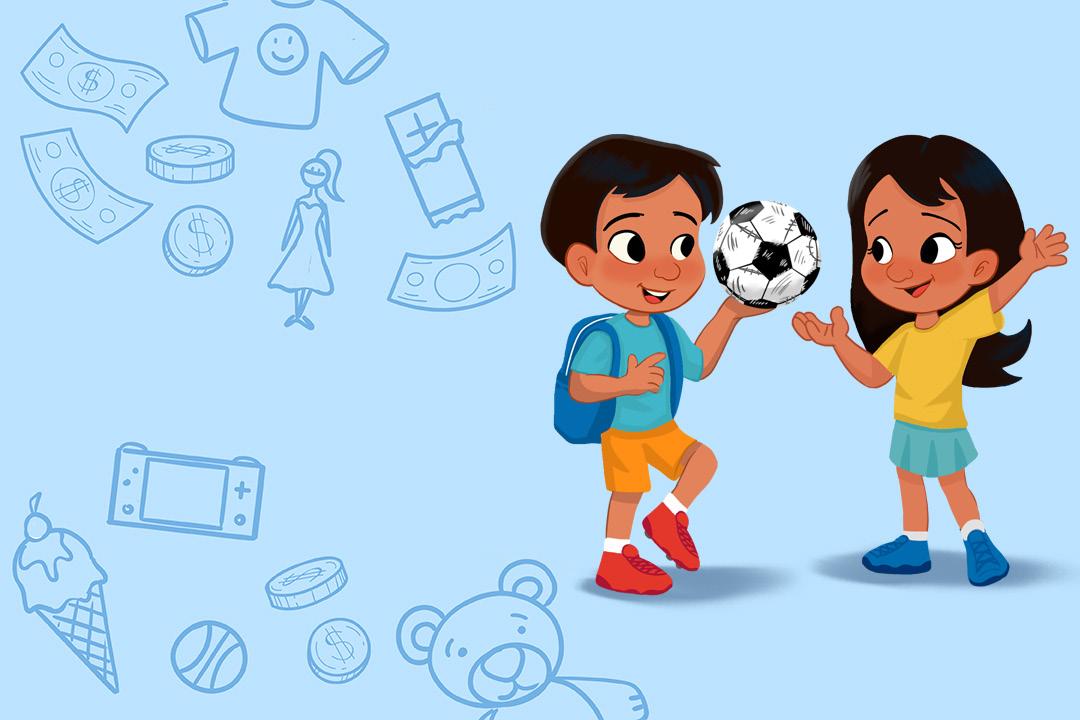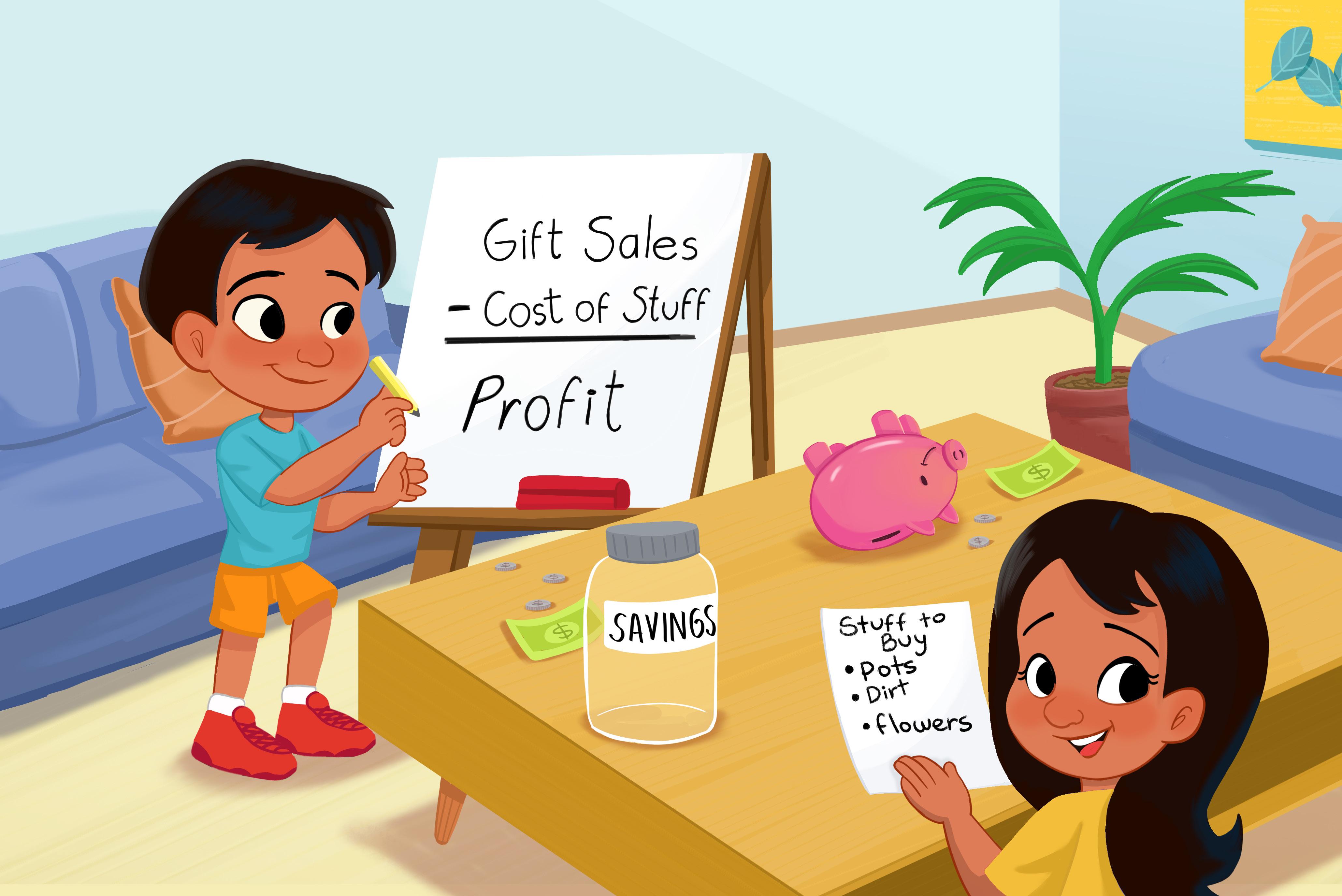

Personal Financial Literacy for Children through Storytelling Learning Guide

Learning Guide

A Surprise for a Friend Learning Guide
Copyright 2025 by Douglas J. Godard
All rights reserved. Printed in the United States of America
ASurpriseforaFriend is the second in a series of illustrated children’s books Doug Godard has written to promote personal financial literacy. The books are used to conduct Financial Literacy Days at elementary schools across the United States.

On Financial Literacy Days, volunteers go into school classrooms to lead interactive read-alouds with kindergarten, first-grade, and second-grade students. Every student receives a copy of the book to keep and take home. For more information on Financial Literacy Days, please go to www.bonzy.org.
Forty-five states require financial education to be taught in schools starting in kindergarten. ASurpriseforaFriend was written to align with the National Standards for Personal Financial Education. ASurpriseforaFriend reinforces the concepts of saving, budgeting, planning, and making good choices.
Teachers use the Learning Guide as a lesson plan following Financial Literacy Days.
Welcome to the Learning Guide for ASurpriseforaFriend . This Learning Guide reinforces the personal financial literacy concepts presented in the book.
• Choices
• Needs
• Wants
• Savings
• Budget
• Profit
• Spending
• Earning Money
• Making Good Choices is Up to You
Have fun choices and make good

Choices
Choices
Picking to do one thing instead of another.
Example: You have choices on how you will spend your money.

Needs
Needs
Something that is important that you cannot do without.
Example: You cannot do without food, water, a place to sleep, or clothing to keep you warm.

Wants
Wants
Something that would be good to have but is not a need.
Example: You want to buy a new soccer ball for fun, but the ball is not a need like fruits, vegetables, and other food.

Savings
Savings
Money that is put aside to pay for needs and wants in the future. Savings can also be invested to created more money in the future.
Example: Putting money that you earned or that you were given into a piggy bank, a jar, or a box. You can also take your money to a bank where they will save it for you and pay you interest.
•
What do YOU think?
• Give examples of why it is important to save money.
• Give an example of a plan
• Give examples of ways



Budget
Budget
A plan for earning money, saving money, donating money, and spending money.
Example: You make a budget before you go to the store to buy stuff.

Profit
Profit
The money you make after you subtract the cost of stuff from sales.
Example: You sell flower gifts for $5 each. Your cost of stuff is $4 for each flower gift. Your profit is $5 minus $4 which is $1. Your profit is $1 for each flower gift.
Profit
If your profit on the sale of each flower gift is $1 and you want to make $10 of total profit, how many gifts will you need to sell.
Answer: 10
If you wanted to buy a ball for $20, how many gifts will you need to sell?
Answer: 20


Spending
Spending
Buying things that you need or want.
Example: You go to the store and you buy a soccer ball with the money you have saved.
What do YOU think?
• What is the difference between a need and a want?
• Adults spend money on some things every month, like mortgage payments, rent, or car payments. With the remaining money, they can purchase needs, purchase some wants, save money, or donate money.
• A budget can provide you with a plan on how to spend your money.
• What would you like to plan for in your budget?
• Give examples of spending to buy things now versus saving to buy things later.

What do YOU think?
•Advertising can inform people about things to purchase.
• Advertising can also make someone think that they need something when they only really want something.
• On what do you see advertised that makes you want to spend your money?


Earning Money
Earning Money
You can earn money by learning a skill and then using that skill to get paid.
Example: You learn to make flower gifts and you use that skill to sell those items at your store.
What do YOU think?
• Another way of saying Earning Money is Earning Income. Income is the money that a person receives for doing their job.
• Here are some jobs that people have to earn income.
• Teacher
• Realtor
• Police Officer
• Warehouse Worker
• Doctor
• Restaurant Waiter
• What other jobs do people have?
What do YOU think?
• People can earn income differently depending on their job.
People can be paid through hourly wages, salaries, commissions, or tips.
• Hourly wages means you get paid income based on the number of hours you work.
• If a person’s income is based on a salary, then they receive the same income every week or two weeks.
• Many salespeople get paid income on a commission basis. They get paid when they sell something.
• Many restaurant waiters earn their income from tips
When they do a good job providing service, the people they help with their meals pay them a percentage of the total food bill.

What do YOU think?
• How do you think people in the following professions earn incomes?
Profession
• Teacher
• Realtor
• Police Officer
• Warehouse Worker
• Doctor
• Restaurant Waiter
Income Type
• Commission
• Hourly Wage
• Salary
• Tips



Making Good Choices is Up to You
Making Good Choices is Up to You
You are responsible for making good choices so your dreams will come true. Learning to read, being prepared for classes, and graduating from high school are choices that you can decide to make right now. Those choices will help make your dreams come true.
Good luck to you!
Please know this to be true above all of the rest.

The good choices that you make will make you your best.
